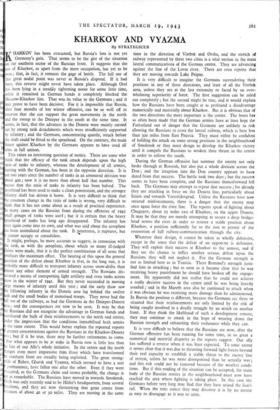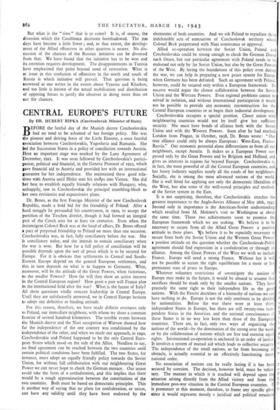KHARKOV AND VYAZMA
By STRATEGICUS HARKOV has been evacuated, but Russia's loss is not yet Germany's gain. That seems to be the gist of the situation the southern sector of the Russian front. It suggests that the use of Kharkov, as apart from the mere occupation, has yet to be won ; that, in fact, it remains the gage of battle. The full use of this great nodal point was never at Russia's disposal. If it had been, this reverse might never have taken place. Although Orel has been lying in a steadily tightening noose for some little time, while it remained in German hands it completely blocked the 4loscow-Kharkov line. That was its value to the Germans ; and it ay prove to have been decisive. For it is impossible that Russia, after four months of her winter offensive, can be so well off in reserves that she can support the great movements in the north and the sweep to the Dnieper in the, south at the same time. It ems, in fact, that the advances in the Donetz were mainly carried ut by strong tank detachments which were insufficiently supported by infantry ; and the Germans, concentrating quietly, struck before he shaft could be fitted to the spearhead. On the contrary, the main ust against Kharkov by the Germans appears to have used all rms in full unison.
This raises an interesting question of tactics. There are some who hink that the efficacy of the tank attack depends upon the high tio of tanks to infantry, whereas the development of all armies, tasting with the German, has been in the opposite direction. It is of two years since the number of tanks in an armoured division was bout 400 ; now it is no more than about half that number. This eans that the ratio of tanks to infantry has been halved. The pearhead has been used to make a clean penetration, and the stronger nfantry shaft has driven it home. It is very difficult to think that
e common change in the ratio of tanks is wrong, very difficult to hink that it has not come about as a result of practical experience. n many cases on the Russian front during the offensive of 1943 mall groups of tanks were used ; but it is certain that the heavy pearhead of tanks has long ago disappeared. The infantry has nce again come into its own, and what was said about the aeroplane as been assimilated about the tank. It penetrates, it ruptures, but t cannot occupy or consolidate.
It might, perhaps, be more accurate to suggest, in connexion with tank, as with the aeroplane, about which so many ill-judged aims were made, that it is the perfect combination of all arms that roduces the maximum effect. The bearing of this upon the general uestion of the defeat about Kharkov is that, in the long run, it is robably more difficult to transport infantry across snow-drifts than lmost any other element of armed strength. The Russians dis- overed a means of transporting light artillery- and even tanks across now in the winter of 1941. But they never succeeded in moving rge masses of infantry until this year ; and the early thaw saw e following infantry in the Donetz area lag behind the swifter and the small bodies of motorised troops. They never had the 11 Ilse of the railways, as had the Germans in the Dnieper-Donetz rea ; and the consequences are now to be seen. It may be that e Russians did not recognise the advantage in German hands and ansferred the bulk of their reinforcements to the north and centre, nder the impression that the conditions immobilised both armies the same extent. This would better explain the repeated reports
f greater concentrations against the Russians in the Kharkov-Donetz ea ; but. if it be true, there may be further retirements to come. For what appears to be at stake in Russia now is little less than
e fate of our Ally's whole initiative. In the centre and the north hanges even more impressive than those which have transformed e southern front are steadily being exploited. The great strong- olds of Rzhev, Ghatsk and Vyazma, which seemed to have a sort permanence, have fallen one after the other. Even if they were 'acuated, as the Germans claim and seems probable, the change is st as remarkable. The Russians have moved in towards Smolensk, !Itch was only recently said to be Hitler's headquarters, from several rections, and they are now threatening that great centre from ',stances of about 4o or so miles. They are moving at the same time in the direction of Vitebsk and Orsha, and the stretch of -railway represented by these two cities is a vital section in the main lateral communications of the German centre. They are advancing against the line of the Lovat river. There are even reports that they are moving towards Lake Peipus.
It is very difficult to imagine the Germans surrendering their positions in any of these directions, and least of all the Vitebsk area, unless they are at the last extremity or faced by an over- whelming superiority of force. The first suggestion can be ruled out completely ; but the second might be true, and it would explain how the Russians have been caught at so profound a disadvantage numerically and materially about Kharkov. But it is obvious that of the two directions the more important is the centre. The boast has so often been made that the German armies have at least kept the Fatherland out of danger that the Germans are unlikely to risk allowing the Russians to cross the lateral railway, which is here less than 30o miles from East Prussia. They must either be confident of holding the attack on some strong positions in the neighbourhood of Smolensk or they must design to develop the Kharkov victory until it compels the Russians to weaken their thrust in the centre in order to relieve the south.
During the German offensive last- summer the enemy not only broke through at Rossosh, but also put a whole division across the Don ; and the irruption into the Don country appears to have dated from that success. The battle took two days ; but the ,success seems to have been complete, and the Russians thenceforward fell back. The Germans may attempt to repeat that success ; for already they are attacking in force on the Donetz line, particularly about Izium and towards Voroshilovgrad. Unless the Russians have now secured reinforcements, there is a danger that the enemy may once again force the river line. The reports speak of fighting about Chuguyev, about 25 miles east of Kharkov, on the upper Donetz. It may be that they are merely attempting to secure a deep bridge- head across the river in order to restore a stable position about Kharkov, a position sufficiently far to the east to permit of the restoration of full railway-communication through the city.
Whatever their design, it cannot be taken as wholly defensive, except in the sense that the defeat of an oppon:nt is defensive. They will exploit their success at Kharkov to the utmost, and if they see the chance to inflict another serious defeat upon the Russians they will not neglect it. For the German strength is not as limited here as in Tunisia. There Rommel's strength justi- fied him in attacking ; but as soon as it became clear that he was receiving heavy punishment he should have broken off the engage- ment. He apparently did not realise that he could not achieve a really decisive success in the centre until he was being heavily assailed ; 'and in the Mareth area also he continued to attack when it was obvious he was receiving more damage than he administered. In Russia the position is different, because the Germans are there so situated that their reinforcements are only limited by the risk of being caught involved in a deadly struggle by an attack on another front. If they think the likelihood of such a development remote, they may continue to attack in the hope of wearing down the Russian strength and exhausting their endurance while they can.
It is very difficult to believe that the Russians are now, after the German offensive has been running for some time, in so great a numerical and material disparity as the reports suggest. Our ally has suffered a reverse when it was least expected. To some extent it seems clear that it was due to thrusting forward light forces beyond their real capacity to establish a stable threat to the enemy line of retreat, unless he was more disorganised than he actually was ; and this risk could not be removed because of the weather condi- tions. But if this reading of the situation can be accepted, the main body of the Russian armies in the neighbourhood must now have reached the area where fighting is taking place. In this case the Germans before very long may find that they have seized the lion's tail. When the time comes they may discover it is by no means as easy to disengage as it was to seize.
But what is the "time" that is to come? It is, of course, the diversion which the Casablanca decisions foreshadowed. The 200 days have become a little fewer ; and, to that extent, the develop- ment of the Allied offensives in other quarters is nearer. No dis- cussion of the chances of the Russian initiative can be divorced from that. We have found that the initiative has to be won and its retention requires development. The disappointments in Tunisia have emphasised that point beyond need of reiteration. What is at issue in this confusion of offensives in the north and south of Russia is which initiative will prevail. That question is being answered as one writes in the events about Vyazma and Kharkov, and too little is known of the actual mobilisation and distribution of opposing forces to justify the observer in doing more than set out the chances.



























 Previous page
Previous page